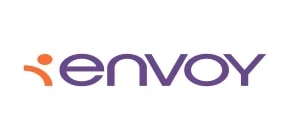Our latest report uncovers emerging trends in U.S. immigration, overseas assignments and more
The 2020 Immigration Trends Report from Envoy Global drives home the fact that foreign talent is more important than ever as the U.S. enters the next decade of the workforce. We surveyed over 400 hiring managers and human resources professionals to learn what government actions are impacting their workforce, what policies they'd like to change and more. What we found is that immigration remains vitally important, as well as some other interesting mobility and talent trends across organizations and industries.
Six emerging immigration trends employers should know about in 2020
1. Companies are using immigration to address skills gaps and a tight labor market while fostering the diverse workforce that the current generation of American workers desire.
Immigration is becoming more critical to employers as high-skilled labor shortages intensify in both the U.S. and globally. This year's Immigration Trends survey found that 85% of employers expect their company's foreign national headcount to increase or remain the same in the next year, a 6% increase from 2019. Meanwhile, it has become clear that organizational diversity is playing a significant role in the competition for talent: 40% of employers reported that recruiting a diverse workforce was the primary driver in the growth of their immigration work, the single largest reason among respondents.
2. Government scrutiny over immigration remains high, and employers are most challenged by a lack of efficiency, transparency and visa availability.
Despite the clear importance of foreign talent in the current economy, only 16% of survey respondents said the visa application process has become easier under the current administration, while 38% said it has become more difficult. Beyond the often-cited increase in RFEs and application denials, 34% of employers reported a lack of transparency as one of their biggest pain points in the immigration process, up from 25% in 2019.
3. More employers are sponsoring foreign nationals for green cards than in any year since 2016, and they're starting the process earlier in an employee's tenure.
Employers are looking to provide foreign nationals with the stability and security that comes with permanent residency, particularly in the face of political uncertainty. This year, 71% of employers said their company has sponsored a foreign national for permanent residence before, up from 66% in 2019. As green card applicants face an unprecedented backlog and long wait times, employers are starting the green card process much earlier in an employee's tenure: 81% of employers that sponsor green cards start the process within or upon the first year of an employee's service, up from 66% in 2019.
4. Leading up to the 2020 presidential election, legislators have proposed substantially more changes with the potential to impact U.S. work authorization.
This election season, employment-based immigration reform is an important issue for business leaders, investors, entrepreneurs, students and university administrators. When asked about the proposed Fairness For High-Skilled Immigrants Act, a piece of bipartisan legislation that would change per-country caps on employment-based green cards, responses were mixed: 36% of employers said it would make hiring and retaining foreign nationals easier, but 31% said would make it harder on their organizations. Meanwhile, 71% of employers said they would support the creation of a "Heartland visa" for rural areas.
5. Non-U.S. global assignments are increasingly a strategic aspect of both talent acquisition and employee development.
As proof that restrictive aspects of the American immigration system are creating opportunities in other countries, 48% of employers said that placing or hiring high-skilled talent for whom they were unable to secure work authorization in the U.S. was the primary driver for their outbound immigration assignments. Global assignments also factor into employee development and retention strategies, with 31% of employers listing rotational programs used to reward or develop high potential employees as the primary force behind their outbound immigration work. Another 36% listed succession planning as the main driver.
6. Canada continues to establish itself as a compelling destination for the world's top talent, and employers are targeting the country as an alternative to U.S. assignments.
While some countries restrict immigration, Canada is taking full advantage with new, fast-track immigration pathways (e.g. Global Talent Stream) to encourage more high-skilled immigration, and it's working: 74% of employers surveyed in our report said they considered Canada's immigration policy to be more favorable than the U.S. and 51% of employers said they were considering Canada for their company's expansion, up from 38% the previous year. Employers cited ease of application, shorter case processing times, and a more favorable permanent residency process as aspects of the country's immigration system that they find beneficial.
For even more insights on the state of foreign hiring and U.S. immigration today, and to benchmark your organization against the competition, be sure to download the full 2020 Immigration Trends Report.
The content of this article is intended to provide a general guide to the subject matter. Specialist advice should be sought about your specific circumstances.

